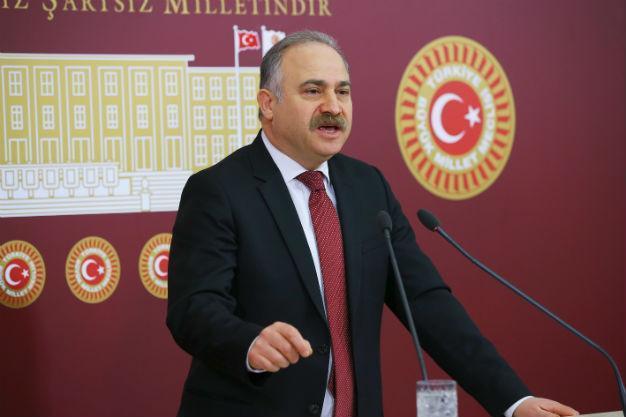CHP: Long recovery ahead for Diyarbakır’s devastated Sur district
ANKARA

AA photo
Residents seeking to return to their normal daily lives in southeastern Diyarbakır province’s “devastated” Sur district, which has been the scene of weeks-long military operations against militants of the outlawed Kurdistan Workers’ Party (PKK), will have to wait five or six years, Turkey’s main opposition party has said.“The curfews in the region have approached their 80th day. In a way which didn’t even happen during the military coup d’état eras, decisions for curfews without timeframes, without interruption and which are beyond tolerance are being implemented unlawfully. Having moved away from democracy, human rights, fundamental rights and freedoms and the constitutional framework, the ruling party is responsible for the deaths of soldiers, police officers and innocent civilian people,” Levent Gök, a deputy parliamentary group chair of the main opposition Republican People’s Party (CHP), told reporters on Feb. 12, referring to the ruling Justice and Development Party (AKP).
Gök was speaking upon visits to Diyarbakır and southeastern Mardin province. Jointly carried out by the military and police, operations were first launched in Sur and the Cizre and Silopi districts of southeastern Şırnak province in mid-December 2015, as the fight against the PKK turned urban. Interior Minister Efkan Ala said on Feb. 11 that security forces had completed their operations against militants in Cizre after weeks of fighting. More than 800 militants have been killed in Cizre and Sur since they were placed under a round-the-clock curfew in December, the army said.
“In Sur, almost 80 percent of [the district’s] buildings have been devastated. Around 50,000 of the population have migrated. Shops and schools are closed and commercial activity has stopped. The district has turned into a ghost city where no people live. Sur, where history and culture also perished, is not the old Sur and will not be able to be so. Despite Prime Minister [Ahmet Davutoğlu’s] assertive discourse, it is not possible to return it to its original state. We anticipate that it can return to its normal life only after five or six years, even if the incidents come to an end as of today and if efforts are exerted in order to revive the district in line with how the prime minister explained,” Gök said.
In late January, Davutoğlu had promised to rebuild areas damaged in the operations and vowed to turn Sur into a “new Toledo,” a reference to the Spanish city which was once a center of learning and co-existence between the three main religions, Christianity, Islam and Judaism. A famous fortress there was badly damaged in the 1936-1939 Spanish Civil War and was restored.
“The ruling party government need to give an account for weapons and ammunition piled up in Sur. How come the PKK members were able to settle there by opening tunnels between houses? Who looked into this?” Gök asked.
“The economy in Mardin has collapsed,” Gök, meanwhile, said. “While around one million local and foreign tourists visited the city each year, this number has dropped to zero, the mayor said. Six hotels have been closed and around 700 people have become unemployed. We haven’t seen anyone in Diyarbakır and Mardin who were able to receive the assistance that was said to have been delivered. The people have been caught between PKK terror and the unlawful practices of the government. The PKK continues being the biggest obstacle in front of solution to the Kurdish issue,” he said, while also criticizing the Kurdish problem-focused Peoples’ Democratic Party (HDP) for not taking a clear stance against the PKK’s activities.
“Unfortunately, in this environment of terror, the HDP has been gradually losing its political clout. We have always accepted the HDP as a voice for our Kurdish origin citizens and as a legitimate counterpart for voicing their proposals. This is still our will but everybody should draw a strict line between itself and terror,” he said.
















